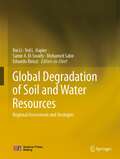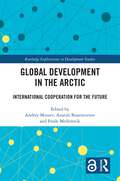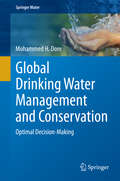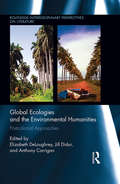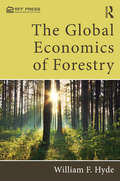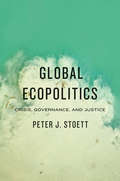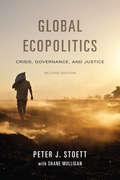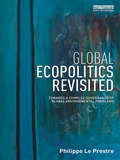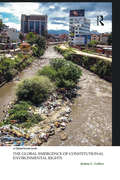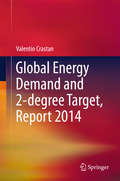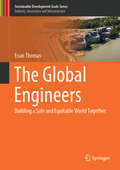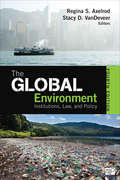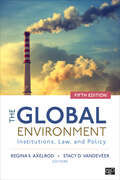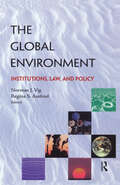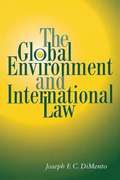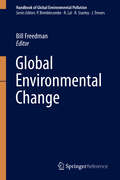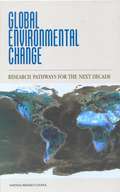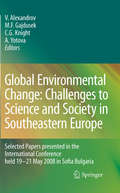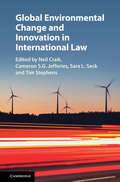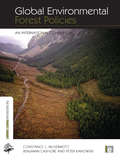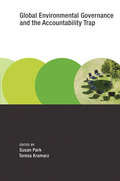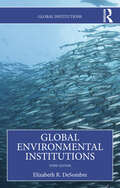- Table View
- List View
Global Degradation of Soil and Water Resources: Regional Assessment and Strategies
by Rui Li Ted L. Napier Samir A. El-Swaify Mohamed Sabir Eduardo RienziThis book focuses on soil and water conservation at global scale. It is a serious environmental problem that will threaten the socio-economic well-being of the majority of global population in future. The book examines the current situation of land degradation in multiple regions of the world and offers alternative approaches to solve the problems through sharing advanced technologies and lessons learned. It provides comprehensive assessment on characteristics, level and effect of degradation in different regions. It’s a highly informative reference both for researchers and graduate students.
Global Development in the Arctic: International Cooperation for the Future (Routledge Explorations in Development Studies)
by Andrey Mineev Anatoli Bourmistrov Frode MellemvikViewing the Arctic as a key region for global development in the 21st century, this book offers a cross-disciplinary conceptual framework for understanding what international cooperation is, why it is difficult and what kind of alternative views can apply in the Arctic. Written by Arctic experts, the book presents major trends and scenarios for international cooperation in the Arctic up to 2035 and future prospects for international cooperation in the Arctic in various sectors: energy, business and economy, transportation and logistics, climate change, diplomacy and security, culture, innovations, higher education and research. Implications of the scenarios for global development are discussed in the light of the United Nations Agenda for Global Development and Sustainable Development Goals (SDGs). The book offers a cross-disciplinary conceptual framework of international cooperation in the Arctic and discusses implications of this framework for global development. Filling the gap in analytical understanding of international cooperation, this book will be of interest to academics, students and professionals concerned with global development and the Arctic region.
Global Drinking Water Management and Conservation
by Mohammed H. DoreThis book discusses different drinking water treatment technologies and what contaminants each treatment method can remove, and at what costs. The production of drinking water requires adequate management. This book attempts to fill the existing knowlegde gap about (a) water treatment technologies and their costs, (b) risk assessment methods, (c) adverse health effects of chemical contaminants, (d) management protocols, and varying regulatory practices in different jurisdictions, and what successes are possible even with small financial outlays. Addressing water consulting engineers, politicians, water managers, ecosystem and environmental activists, and water policy researchers, and being clearly structured through a division in four parts, this book considers theoretical aspects, technologies, chemical contaminants and their possible elimination, and illustrates all aspects in selected international case studies. Source-water protection, water treatment technology, and the water distribution network are critically reviewed and discussed. The book suggests improvements for the management of risks and financial viability of the treatment infrastructure, as well as ways toward an optimal management of the distribution network through the risk-based management of all infrastructure assets.
Global Ecologies and the Environmental Humanities: Postcolonial Approaches (Routledge Interdisciplinary Perspectives on Literature)
by Edited by Elizabeth DeLoughrey, Jill Didur, and Anthony CarriganThis book examines current trends in scholarly thinking about the new field of the Environmental Humanities, focusing in particular on how the history of globalization and imperialism represents a special challenge to the representation of environmental issues. Essays in this path-breaking collection examine the role that narrative, visual, and aesthetic forms can play in drawing attention to and shaping our ideas about long-term and catastrophic environmental challenges such as climate change, militarism, deforestation, the pollution and management of the global commons, petrocapitalism, and the commodification of nature. The volume presents a postcolonial approach to the environmental humanities, especially in conjunction with current thinking in areas such as political ecology and environmental justice. Spanning regions such as Africa, Asia, Eastern Europe, Latin America and the Caribbean, Australasia and the Pacific, as well as North America, the volume includes essays by founding figures in the field as well as new scholars, providing vital new interdisciplinary perspectives on: the politics of the earth; disaster, vulnerability, and resilience; political ecologies and environmental justice; world ecologies; and the Anthropocene. In engaging critical ecologies, the volume poses a postcolonial environmental humanities for the twenty-first century. At the heart of this is a conviction that a thoroughly global, postcolonial, and comparative approach is essential to defining the emergent field of the environmental humanities, and that this field has much to offer in understanding critical issues surrounding the creation of alternative ecological futures.
The Global Economics of Forestry
by William F. HydeThis book traces the economic and biological pattern of forest development from initial settlement and harvest activity at the natural forest frontier to modern industrial forest plantations. It builds from diagrams describing three discrete stages of forest development, and then discusses the management and policy implications associated with each, supporting its observations with examples and data from six continents and from both developed and developing countries. It shows that characteristic distinctions between the three stages make forestry unusual in natural resource management and that effective policy requires different, even contrasting, decisions at each stage. William F. Hyde’s comprehensive discussion covers a wide range of issues, including the impacts of both specific forest policies and broader macroeconomic policies, the unique requirements of current issues such as global warming, biodiversity and tourism, and the complexities of the different forest products industries. Concluding chapters review the roles of the newer institutional landowners, of smaller private and farm landowners, and of public agencies. This highly-original volume reaches far beyond forest economics; it explains what forestry can do for regional development and environmental conservation and what policies designed for other sectors and the macro-economy can do for forestry.
Global Ecopolitics: Crisis, Governance, And Justice
by Peter StoettDespite sporadic news coverage of extreme weather, international conventions on climate change, or special UN days, rarely do we participate in a sustained analysis of environmental policy making. To remedy this shortcoming and to propel the discussion forward, Peter J. Stoett provides a concise introduction to environmental governance. Through seven case studies, Stoett analyzes the ability of international policy to provide environmental protection and discusses the ever-present factors of equality, sovereignty, and human rights integral to these issues. While providing a panoramic view of the actors and structures producing these policies, Stoett reminds readers that the topic is personal, that responsible governance is not solely the charge of governments but of individuals and communities as well.
Global Ecopolitics: Crisis, Governance, and Justice, Second Edition
by Peter StoettDespite sporadic news coverage of extreme weather events, high-level climate change diplomacy, special UN days of celebration, and popular media references to impending ecological collapse, most students are not exposed to the detailed presentation and analysis of the international relations and diplomacy of environmental policy-making. Comprehensive and accessibly written for first-year or second-year undergraduates, the second edition of Global Ecopolitics provides students with a panoramic view of the policymakers and the structuring bodies involved in the creation of environmental policies. Detailing a considerable amount of environmental activity since its initial 2012 publication, this up-to-date second edition uses an applicable framework of systemic analysis and important case studies that push students to form their own conclusions about past efforts, present needs, and future directions.
Global Ecopolitics Revisited: Towards a complex governance of global environmental problems
by Philippe Le PrestreFaced with worsening environmental indicators, cooperation hurdles, and the limited effectiveness of current institutions, reforming international environmental governance has proven elusive, despite various diplomatic initiatives at the United Nations level over the last two decades. Overcoming the current dead end, however, may rest less in devising new arrangements than in challenging how the problem has been approached. Presenting a multifaceted exploration of some of the key issues and questions in global ecopolitics, this book brings together recent advances in research on global environmental governance in order to identify new avenues of inquiry and action. Each chapter questions elements of the current wisdom and covers a topic that lies at the heart of global environmental governance, including the reasons for engagement, the evolving relationship between science and policy, the potential and limits of the European Union as a key actor, the role of developing and emergent countries, and the contours of a complex governance of international environmental issues. Laying the foundation for rethinking at a time of great transformation in global ecopolitics, this book will be important reading for students of environmental politics and governance. It will also be of relevance to policy makers with an interest in going beyond the prevailing discourse on this crucial topic.
The Global Emergence of Constitutional Environmental Rights (Law, Justice and Ecology)
by Joshua C. GellersOver the past 40 years, countries throughout the world have similarly adopted human rights related to environmental governance and protection in national constitutions. Interestingly, these countries vary widely in terms of geography, politics, history, resources, and wealth. This raises the question: why do some countries have constitutional environmental rights while others do not? Bringing together theory from law, political science, and sociology, a global statistical analysis, and a comparative study of constitutional design in South Asia, Gellers presents a comprehensive response to this important question. Moving beyond normative debates and anecdotal developments in case law, as well as efforts to describe and categorize such rights around the world, this book provides a systematic analysis of the expansion of environmental rights using social science methods and theory. The resulting theoretical framework and empirical evidence offer new insights into how domestic and international factors interact during the constitution drafting process to produce new law that is both locally relevant and globally resonant. Scholars, practitioners, and students of law, political science, and sociology interested in understanding how institutions cope with complex problems like environmental degradation and human rights violations will find this book to be essential reading.
Global Energy Demand and 2-degree Target, Report 2014
by Valentin CrastanThis report takes a neutral and independent point of view in attempting to show concrete ways to achieve the goal of reducing CO2 emissions and limiting global warming to the 2-degree target. It presents an overall picture spanning all key countries. In the report, the temporal evolution of the main parameters is given from 1970 to 2011 for all regions of the world and all G-20 countries, starting from the basic data, gross domestic consumption. The parameters are then extrapolated to 2030, taking into account current trends, local factors and the requirements of the 2-degree climate target. An important basis is the structure of the current energy consumption and energy flows of all regions of the world and all G-20 countries, which is analyzed in the appendix in detail and reproduced as clearly as possible. The reports from climate science make it clear that with a greater level of warming, adaptation is the more expensive option. Compliance with the 2-degree climate target is a challenge, but not impossible. The book is intended not only for the scientific community but also for decision makers in government and industry.
The Global Engineers: Building a Safe and Equitable World Together (Sustainable Development Goals Series)
by Evan ThomasThe Global Engineers: Building a Safe and Equitable World Together, is inspired by the opportunities for engineers to contribute to global prosperity. This book presents a vision for Global Engineering, and identifies that engineers should be concerned with the unequal and unjust distribution of access to basic services, such as water, sanitation, energy, food, transportation, and shelter. As engineers, we should place an emphasis on identifying the drivers, determinants, and solutions to increasing equitable access to reliable services. Global Engineering envisions a world where everyone has safe water, sanitation, energy, food, shelter, and infrastructure, and can live in health, dignity, and prosperity.This book seeks to examine the role and ultimately the impact of engineers in global development. Engineers are solutions-oriented people. We enjoy the opportunity to identify a product or need, and design appropriate technical solutions. However, the structural and historical barriers to global prosperity requires that Engineers focus more broadly on improving the tools and practice of poverty reduction and that we include health, economics, policy, and governance as relevant expertise with which we are conversant.Engineers must become activists and advocates, rejecting ahistorical technocratic approaches that suggest poverty can be solved without justice or equity. Engineers must leverage our professional skills and capacity to generate evidence and positive impact toward rectifying inequalities and improving lives.Half of this book is dedicated to profiles of engineers and other technical professionals who have dedicated their careers to searching for solutions to global development challenges. These stories introduce the reader to the diverse opportunities and challenges in Global Engineering.
The Global Environment: Institutions, Law, and Policy
by Regina S. Axelrod Stacy D. VanDeveerThe new edition of Regina S. Axelrod and Stacy D. VanDeveer’s award-winning volume, The Global Environment: Institutions, Law, and Policy, reflects the latest events in global environmental politics and sustainable development while providing balanced coverage of the key institutions, issues, laws, and policies. The volume has been reorganized to better highlight global environmental institutions, major state and non-state actors, and includes an expanded set of cases such as climate change, biodiversity, hazardous chemicals, ozone layer depletion, nuclear energy and resource consumption. Based on reviewer feedback, the new edition broadens coverage of the growing global environmental agenda and explores the relationships between states, NGOs, and international organizations.
The Global Environment: Institutions, Law, and Policy
by Regina S. Axelrod Stacy D. VanDeveerThe new edition of The Global Environment: Institutions, Law, and Policy by Regina S. Axelrod and Stacy D. VanDeveer reflects the latest events in the in global environmental politics and sustainable development, while providing balanced coverage of the key institutions, environmental issues, treaties, and policies. This award-winning book highlights global environmental institutions, major state and non-state actors, and includes a wide range of cases such as climate change, biodiversity, hazardous chemicals, ozone layer depletion, nuclear energy and resource consumption.
The Global Environment: Institutions, Law, and Policy
by Regina S. Axelrod Stacy D. VanDeveerThe new edition of The Global Environment: Institutions, Law, and Policy by Regina S. Axelrod and Stacy D. VanDeveer reflects the latest events in the in global environmental politics and sustainable development, while providing balanced coverage of the key institutions, environmental issues, treaties, and policies. This award-winning book highlights global environmental institutions, major state and non-state actors, and includes a wide range of cases such as climate change, biodiversity, hazardous chemicals, ozone layer depletion, nuclear energy and resource consumption.
The Global Environment: Institutions, Law, and Policy
by Stacy D. Vandeveer Regina S. AxelrodThe new edition of Regina S. Axelrod and Stacy D. VanDeveer’s award-winning volume, The Global Environment: Institutions, Law, and Policy, reflects the latest events in global environmental politics and sustainable development while providing balanced coverage of the key institutions, issues, laws, and policies. The volume has been reorganized to better highlight global environmental institutions, major state and non-state actors, and includes an expanded set of cases such as climate change, biodiversity, hazardous chemicals, ozone layer depletion, nuclear energy and resource consumption. Based on reviewer feedback, the new edition broadens coverage of the growing global environmental agenda and explores the relationships between states, NGOs, and international organizations.
The Global Environment: Institutions, Law and Policy
by Norman J. Vig Regina S. AxelrodAll serious environmental threats are now international in scope and more than one thousand international environmental agreements already exist. Yet the prospects for international cooperation leading to the management of impacts on the planet remain grim. The Global Environment meets the need for an authoritative assessment of the state of international environmental institutions, laws and policies at the end of the 20th century.The book examines disagreements over the meaning of sustainable development, problems inherent in implementing environmental policies and the conflict over the exclusion of developing countries from the Kyoto Protocol. It discusses the profound trade-offs that may be required, the role of international financial interests in promoting incompatible forms of development and analyses international environmental institutions, law and policy and sustainable development.
The Global Environment and International Law
by Joseph F. C. DimentoInternational law has become the key arena for protecting the global environment. Since the 1970s, literally hundreds of international treaties, protocols, conventions, and rules under customary law have been enacted to deal with such problems as global warming, biodiversity loss, and toxic pollution. Proponents of the legal approach to environmental protection have already achieved significant successes in such areas as saving endangered species, reducing pollution, and cleaning up whole regions, but skeptics point to ongoing environmental degradation to argue that international law is an ineffective tool for protecting the global environment.
Global Environmental Change
by Bill FreedmanThe handbook Global Environmental Change is intended to serve as a reliable and comprehensive resource to attend the needs of researchers, teachers, students, and professionals working in science and policy aspects relevant to environment and sustainability. Entries in the handbook are arranged by major section, and are extensively cross-referenced to allow users to find related titles in a user-friendly way. The handbook is available as a printed volume and as an on-line reference work.
Global Environmental Change: Research Pathways for the Next Decade
by National Research CouncilHow can we understand and rise to the environmental challenges of global change? One clear answer is to understand the science of global change, not solely in terms of the processes that control changes in climate and the composition of the atmosphere, but in how ecosystems and human society interact with these changes. In the last two decades of the twentieth century, a number of such research efforts--supported by computer and satellite technology--have been launched. Yet many opportunities for integration remain unexploited, and many fundamental questions remain about the earth's capacity to support a growing human population.This volume encourages a renewed commitment to understanding global change and sets a direction for research in the decade ahead. Through case studies the book explores what can be learned from the lessons of the past 20 years and what are the outstanding scientific questions. Highlights include: Research imperatives and strategies for investigators in the areas of atmospheric chemistry, climate, ecosystem studies, and human dimensions of global change.The context of climate change, including lessons to be gleaned from paleoclimatology.Human responses to--and forcing of--projected global change. This book offers a comprehensive overview of global change research to date and provides a framework for answering urgent questions.
Global Environmental Change: Challenges to Science and Society in Southeastern Europe
by Antoaneta Yotova C. Gregory Knight Martin Felix Gajdusek Vesselin AlexandrovSelected papers from the International Conference "Global Environmental Change: Challenges for Science and Society in South-Eastern Europe" held 19-21 May 2008 in Sofia, Bulgaria. Covers changes in climate, land use, carbon and water cycles, air quality, etc.
Global Environmental Change and Innovation in International Law
by Neil Craik Cameron S. Jefferies Sara L. Seck Tim StephensThe challenges to global order posed by rapid environmental change are increasingly recognized as defining features of our time. In this groundbreaking work, the concept of innovation is deployed to explore normative and institutional responses in international law to such environmental change by addressing two fundamental themes: first, whether law can foresee, prevent, and adapt to environmental transformations; and second, whether international legal responses to social, economic, and technological innovation can appropriately reflect the evolving needs of contemporary societies at national and international scales. Using a range of case studies, the contributions to this collection track innovation - descriptively, normatively, and as a process in and of itself - to explain international environmental law's functionality in the Anthropocene. This book should be read by anyone interested in the critical intersection of environmental and international law.
Global Environmental Constitutionalism
by James R. May Erin DalyReflecting a global trend, scores of countries have affirmed that their citizens are entitled to healthy air, water, and land and that their constitution should guarantee certain environmental rights. This book examines the increasing recognition that the environment is a proper subject for protection in constitutional texts and for vindication by constitutional courts. This phenomenon, which the authors call environmental constitutionalism, represents the confluence of constitutional law, international law, human rights, and environmental law. National apex and constitutional courts are exhibiting a growing interest in environmental rights, and as courts become more aware of what their peers are doing, this momentum is likely to increase. This book explains why such provisions came into being, how they are expressed, and the extent to which they have been, and might be, enforced judicially. It is a singular resource for evaluating the content of and hope for constitutional environmental rights.
Global Environmental Forest Policies: An International Comparison (The Earthscan Forest Library)
by Constance McDermott Benjamin Cashore Peter KanowskiMarket globalization and the globalization of environmental concerns have spurred demand for greater international accountability for forest stewardship. In response, a range of multi-lateral governmental and non-governmental initiatives have emerged to redefine the rules of global trade, and demand verification of the legality and/or sustainability of forest products originating from within and outside national boundaries. At the same time there is a lack of transparency and shared understanding about the environmental forest policies that already exist within the world's leading forest producing and consuming countries. The result is that many stakeholders have developed perceptions about a country's regulatory environment that are not consistent with what is actually taking place. This book provides a uniquely detailed and systematic comparison of environmental forest policies and enforcement in twenty countries worldwide, covering developed, transition and developing economies. The goal is to enhance global policy learning and promote well-informed and precisely tuned policy solutions.
Global Environmental Governance and the Accountability Trap (Earth System Governance)
by Susan Park Teresa KramarzAn examination of whether accountability mechanisms in global environmental governance that focus on monitoring and enforcement necessarily lead to better governance and better environmental outcomes. The rapid development of global environmental governance has been accompanied by questions of accountability. Efforts to address what has been called “a culture of unaccountability” include greater transparency, public justification for governance decisions, and the establishment of monitoring and enforcement procedures. And yet, as this volume shows, these can lead to an “accountability trap”—a focus on accountability measures rather than improved environmental outcomes. Through analyses and case studies, the contributors consider how accountability is being used within global environmental governance and if the proliferation of accountability tools enables governance to better address global environmental deterioration. Examining public, private, voluntary, and hybrid types of global environmental governance, the volume shows that the different governance goals of the various actors shape the accompanying accountability processes. These goals—from serving constituents to reaping economic benefits—determine to whom and for what the actors must account. After laying out a theoretical framework for its analyses, the book addresses governance in the key areas of climate change, biodiversity, fisheries, and trade and global value chains. The contributors find that normative biases shape accountability processes, and they explore the potential of feedback mechanisms between institutions and accountability rules for enabling better governance and better environmental outcomes. Contributors Graeme Auld, Harro van Asselt, Cristina Balboa, Lieke Brouwer, Lorraine Elliott, Lars H. Gulbrandsen, Aarti Gupta, Teresa Kramarz, Susan Park, Philipp Pattberg, William H. Schaedla, Hamish van der Ven, Oscar Widerberg
Global Environmental Institutions (ISSN)
by Elizabeth R. DeSombreGlobal Environmental Institutions provides the most accessible and succinct overview of the major global institutions attempting to protect the natural environment, describing their creation and operation, decision-making processes, interactions with other institutions, and impact. Fully updated throughout, this third edition maintains the clear structure of previous editions, examining the underlying causes of global environmental problems creation of global environmental institutions effectiveness of action undertaken by these institutions Providing an overview of the United Nations Environment Programme alongside other entities that play important roles in global environmental governance, this book examines institutions by issue area and introduces organizations with a specific focus on protecting endangered species and biodiversity, the atmosphere, the ocean environment, and regulating the transboundary movement of hazardous substances. Drawing on the latest scholarship, and written by an acknowledged expert in the field, this study is essential reading for students of environmental politics and international organizations.
